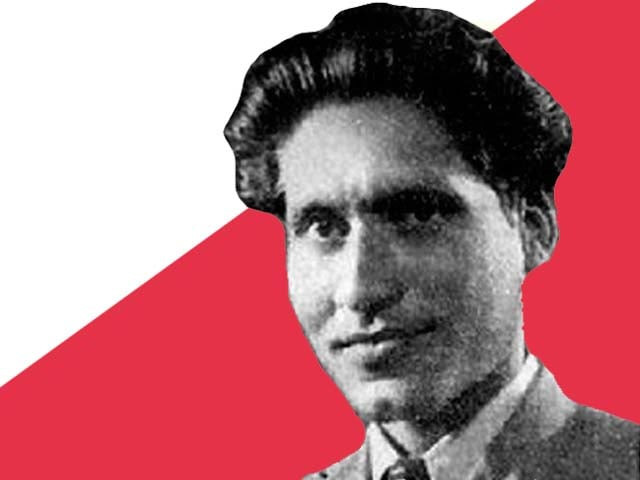‘Koi Hindu hai koi Musalman
Kis se poochoon main Insaan kahaan hai’
(Someone is a Hindu, someone a Muslim, what a calamity
Who should I ask, where is humanity)
– Marg-e-Insaniyat (The Death of Humanity), on partition, Sulaiman Areeb
Sulaiman Areeb, who passed away from throat cancer 50 years ago today, was born on April 5, 1922 in Hyderabad Deccan. Though Areeb had started reciting poetry from the time of studentship, he systematically started reciting poetry since 1944. In the beginning, he also wrote short stories, dramas and essays but he abandoned writing prose afterwards.
Areeb became a member of the Communist Party of India in 1948 and he was arrested by the military government after the police action in Hyderabad for the crime of reciting his revolutionary poem Mujahid-e-Telangana (The Crusader of Telangana) and he spent two years in jail. After being released from jail, he was elected as the secretary of the Peace Committee and the Anjuman Awami Musannifeen (Peoples Writers Association); and in 1952 he was re-arrested in connection with the strike of the students and remained in jail for two months. In 1954, Areeb disassociated from the Communist Party.
In 1948, Areeb was the editor of the weekly Jamhoor (People); and remained the editor of the monthly Chiragh (Lamp) in 1951 and the editor of the monthly Sab Ras (All Quintessence) in 1953. At the time of his untimely death, he had been issuing the monthly Saba (Breeze) himself since 1955.
In his short life, Areeb managed to release only two collections of poetry, the first one titled Paas-e-Gareebaan (Near the Noose) in 1961 and a second one, Kadvi Khushboo (Bitter Fragrance), published posthumously in 1973. It is strange that the leading literary critic Khalilur Rahman Azmi, in his magnum opus on the Progressive Writers Movement published in 1979, dismisses Areeb, among other poets, in just one line as being ‘painfully uniform’, despite the fact that Areeb himself admits in the preface to Paas-e-Gareebaan that he discarded a great part of his poems because they had a preponderance for sloganeering and belonging to the lesser proportion of literature.
About the poem in my original translation here – Insaan Nahi Mar Sakta (Man is Immortal) – which we may regard as one of his most important poems, Areeb says that it was one of the poems he did not discard because this was not mere propaganda and he had an emotional attachment to it, in that this was perhaps his final poem after which he could not write another poem.
This poem, written in 1951, is a beautiful ode to the immortality of man, written by a great poet who passed away even before he was fifty. His optimism for man and life is on offer in the last stanza of this poem:
‘Chashm-e-tareekh ne har baar magar dekha hai
Mere jamhoor kabhi dab na sake, jhuk na sake
Aur sarfaraz rahe
Mera insaan kabhi mar na saka, mit na saka
Aur insaan nahin mar sakta.’
~
Many times before these turns have come
Your anklet’s rhythm
The sound of your bracelet throwing a tantrum
My verses, my songs, my tunes, my destined connection
My songs sung during my passage for battle
Were changed into a grieving tinkle
Were dissolved into a death rattle.
These turns have come many times before
The goblet and the jar were seized from the wine drinkers
Seized too was every pleasure
Honours, modesties were offered up for auction
Farms were looted, wages grabbed by usurpation
Spurned by the king’s mansion
How many Pyramids given to construction
The hunger for loot birthed Hitlers, birthed wars, birthed desolation
Life was decorated by pain, crushed, became a dripping laceration.
Many times before these turns have come
For bread and clothes, for the lamps, for the home
For the ornaments, bangles, the sindoor-filled hair partings, the good fortunes of wifehood
For the smiles of the rosy-cheeked
For the twist in the tress’s fragrance
For love and elegance
For the gardens of springs, for the rose gardens
For the protection of peace and freedom and prosperity and civilisation.
Whenever we rise in rebellion
Ready, arrayed, we who are under subjugation
The chains came forward to welcome
And the doors of prisons opened in unison
The ropes of the noose waved in anticipation.
But it has been witnessed every time by the eye of history
My people could never be suppressed, or bent before any functionary
And remained elevated on a pedestal
My Man could not be removed, was ever immortal
And Man is immortal.



COMMENTS
Comments are moderated and generally will be posted if they are on-topic and not abusive.
For more information, please see our Comments FAQ